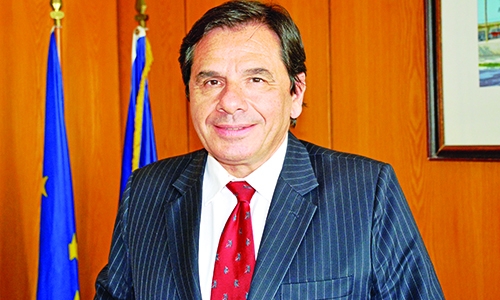‘No discrimination against Muslims post Paris attacks’
French Ambassador to Bahrain Bernard Régnauld-Fabre categorically denies any discrimination against the French Muslims due to their religion after the Paris attacks. In an exclusive interview to DT News, Régnauld-Fabre talks about the burgeoning ties between Bahrain and France, besides a range of topics, including ISIS and Syria issues.
Excerpts:
After the Paris attacks, media reports claimed that many Muslim citizens were targeted and fired from their jobs. How do you react to this?
I cannot let you say or even imply that Muslims living in France are being persecuted on the basis of their faith or religious affiliation. That is untrue. France is a secular country with a deep commitment to the respect of various beliefs. Last year, France endured several bloody terrorist attacks (In January and November 2015 in Paris) that killed more than 140 people and left several hundreds injured.
The perpetrators of these heinous acts must be prosecuted for their actions, and not on the basis of their background or their religious allegiance. The millions of Muslims living in France practise their religion in a normal way and are integrated into the fabric of society without any discrimination.
How does France, being one of the biggest world powers, approach the deteriorating Syrian crisis?
The civil war in Syria is obviously very serious and is characterised by a degree of internationalisation rarely attained in recent years, which is worrying.
The latest developments show that diplomatic efforts can achieve certain results. The ceasefire, prepared under the guidance of the Special Envoy of the Secretary-General of the United Nations, de Mistura, in force since the evening of February 27, is the first tangible sign of hope after nearly five years of war.
France hopes that the ceasefire will allow the resumption of talks between the various conflicting parties to endorse the legal framework of a policy transmission. The basis for the discussions lies in the Security Council’s resolutions 2254 and 2268. It is a question of negotiating a new constitution, holding elections and establishing a credible and inclusive government. In the near future, priority lies in the delivering humanitarian aid to besieged civilian populations.
How do you see Russia’s presence in Syria? Is it a signal that the world is once again moving toward a bipolar system or is it a ploy to weaken its power through such engagements?
The nature of Russia’s presence in Syria is ambiguous. Whilst President Putin announced in New York in September 2015 that Russian forces would only fight against the fighters of the Islamic State and Al Nosra, Russian bombings were in fact also directed at, and this even more often so, resistance groups part of the moderate opposition gathered around the Riyadh platform.
On this aspect, the ceasefire has been helpful in shedding light by distinguishing the terrorist groups from those who negotiate and which should no longer be touched by the Russian army.
Regarding the other aspect of your question, I do not believe the world is headed once again towards a bi-polarity as had been characteristic of the Cold War until 1991.
Russia obviously possesses significant weight on the international stage but has lost the monopolistic aspect of its strategic relations with the United States. The world today is increasingly defined by a multi-polarity linked to the emergence of new powers.
How do you think that the menace of terrorism can be rooted out especially after the emergence of the Islamic State?
The issue of terrorism is a global threat that affects East and West alike. No country or land can consider itself immune. As it is a global threat, the response to it must also be global in nature and terrorism must be defeated by all means. It needs to be ensured that the Islamic State is deprived of its sources of funding, and propaganda that could tantalise gullible youths. It is a lengthy battle but we will not give up.
How do you define French-Bahraini relations?
Relations between France and Bahrain are excellent. It involves frequent visits and in depth discussions at the highest level. His Majesty King Hamad bin Isa Al Khalifa visited Paris and met with the President of France on September 8, 2015.
Matthias Fekl, Minister of State for Foreign Trade, the Promotion of Tourism and French Nationals Abroad visited Bahrain on January 21. He was received by His Majesty King Hamad. Fekl presided over the signing of two important agreements on the sale of 29 Airbus aircraft to Gulf Air (3.4 billion euros) and a cooperation agreement in the field of urban planning under the auspices of the consortium led by Expertise France (8.4 million euros).
He was also present at the foundation stone laying ceremony of an industrial project of the firm Fives on behalf of GARMCO (47 million euros). Our relationship is confident and converging on most of the major international issues. The French community living in Bahrain, which exceeds 1000 people, is happy and contributes in several areas towards the development of this strong and harmonious relationship.
Related Posts

